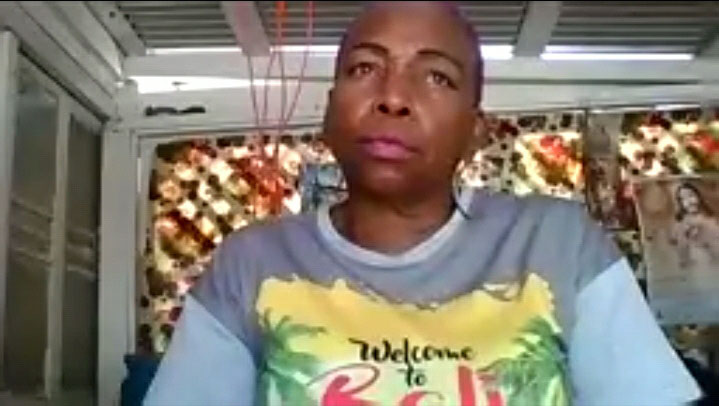Jamaican national, Sandra Russell, has been awarded damages in the sum of $3.1 million dollars against the State for unlawfully detaining and breaching her constitutional rights after she was kept at the East La Penitence Police Station for almost eight months without charge after serving a sentence for narcotic possession.
In a ruling yesterday morning, acting Chief Justice Roxane George who presided over the matter, said the Court found that the woman had been unlawfully detained and deprived of her right to freedom of movement.
In the circumstances, the Judge said that Russell would be granted the declarations sought; while noting that an award of damages was necessary, though not in the amount she was seeking.
Given the facts of this case the judge said that Russell (the Applicant) contributed to her predicament by overstaying her time and committing a serious offence. “It cannot be countenanced that she would be handsomely rewarded for self-inflicted breaches,” the Chief Justice said.
Russell was granted compensatory damages of $500,000 for each of the five months she had been unlawfully detained and $75,000 for each of the eight months she was subjected to cruel and inhumane conditions.
Additionally, the Attor-ney General (the Respondent) was ordered to pay costs in the sum of $250,000.
Justice George further declared that since Russell is not a citizen of Guyana, and has clearly overstayed her time, she must be repatriated back to Jamaica, though not at the expense of the State.
The judge said that if she is unable to stand her return expenses, it is be deducted from the cost imposed against the State.
In the analysis of her ruling, Chief Justice George said she did not accept the State’s contention that the Applicant was not entitled to redress; having found that she was unlawfully detained and her right to freedom of movement breached.
Referencing the facts of the case, the judge said that immigration authorities clearly deemed Russell to have been a prohibited immigrant, and so on her release from prison, arrested and detained her.
The judge said that while the State needed sometime to investigate and verify the applicant’s nationality which could not immediately be ascertained in order to have her removed from Guyana—in accordance with the Immigration Act—she ought to have been taken to court for the presentation of the case against her and the relevant orders of the court sought, as opposed to just detaining her.
“The provisions of the Act clearly don’t contemplate lengthy detention, but rather strongly speaks to timeous action,” the judge said.
Justice George said that in accordance with Article 139 (2) of the Constitution, no law providing for preventive detention shall authorise the detention of a person for more than three months unless a tribunal grants an extension.
Against this background, the judge held that of the eight-month period of detention, the State had three months in which to make a determination regarding the Applicant’s situation. “Therefore I hereby declare that the Applicant was unlawfully detained and deprived of her freedom of movement for five months,” Justice George declared.
On the issue of the conditions under which Russell was detained, the Court said that the State had not countered the claims made by the Applicant and so her assertions were taken to be true.
The claim of the Attorney General had been that the State had no knowledge of Russell’s claims. The Court declared, however, that it is the duty of the State to have such knowledge, even as it noted that the fact that others may have endured poor conditions “does not make them acceptable.”
On this point the judge issued a stern reprimand against the State shielding behind the socio-economic circumstances of Guyana. “The claim of the so-called third world state cannot be permitted to be a continual excuse for poor conditions and cannot be countenanced as being the best the State can do,” the Chief Justice said.
She said that while the State relied on case law authority decided in 1998, this is the twenty-first century and pointed to the incorporation of several International Human Rights Conventions; including the International Covenant on Civil and Political Rights into Guyana’s Constitution.
“The State must do better as regards facilities for the incarceration of persons,” the judge emphasised.
The Chief Justice said she acknowledges the negative matters against the Applicant, but noted that they did not justify her prolonged detention.
Russell had been imprisoned back in 2018 for possession of cannabis for trafficking, but filed a lawsuit for false imprisonment against the state after serving her sentence.
Through her attorney Darren Wade, Russell had asked the Supreme Court to declare that her fundamental rights to liberty and freedom of movement were breached and that she suffered inhuman and degrading treatment. The application also asked the court to declare that the Guyana Police Force and Immigration Officers had no legal authority to further imprison her beyond her prison sentence and that she was falsely imprisoned.
Russell was hoping for a payout of $10 million for each day she was unlawfully kept in custody; over $20 million for inhuman and degrading treatment; over $20 million for the breach of her freedom of movement; and over $50 million for false imprisonment.
Russell had been sentenced to eight months in prison and fined $135,000 in June, 2018, after she admitted to a charge of the possession of 70 grammes of cannabis for the purpose of trafficking.
She was, however, released from the New Amsterdam Prison in November of the same year after a reduction of her sentence by three and a half months.
In a supporting affidavit, she deposed that she was released into the custody of a female immigration officer who informed her that she would be deported to Jamaica. She noted that no deportation order had been granted against her.
Russell stated in her affidavit that while in the custody of the immigration officer, the rank received a phone call and then informed her that she would no longer be taken to the Immigration Office but instead to the East La Penitence Police Station.
“Whilst at the East La Penitence Police Station I was not taken before any Magistrate nor Judge… I fell ill because of poor conditions, and not having proper adequate meals and supplements,” she had said, before noting that she was then taken to the East La Penitence Health Centre, where she was treated and given medication.
In the affidavit, Russell further asserted that the conditions she was forced to live in at the police station caused her to become depressed and stressed. “At the East La Penitence Police Station the lighting and ventilation was very poor and I spent all the time in the cell and had no leisure nor physical activities,” she said.
It was further noted that there were only three cells at the station and at times there could be anywhere from three to twenty prisoners “packed like sardines” in them.
According to Russell, she was released from custody on July 7th, 2019 on $10,000 bail and expressed the belief that this was only because of the intervention of the Kaieteur News. “I am advised by my attorney-at-law and verily believe that the police had no legal authority to keep me in custody after seventy two (hours) without charging me or taking me before court for an extension,” she had argued.







